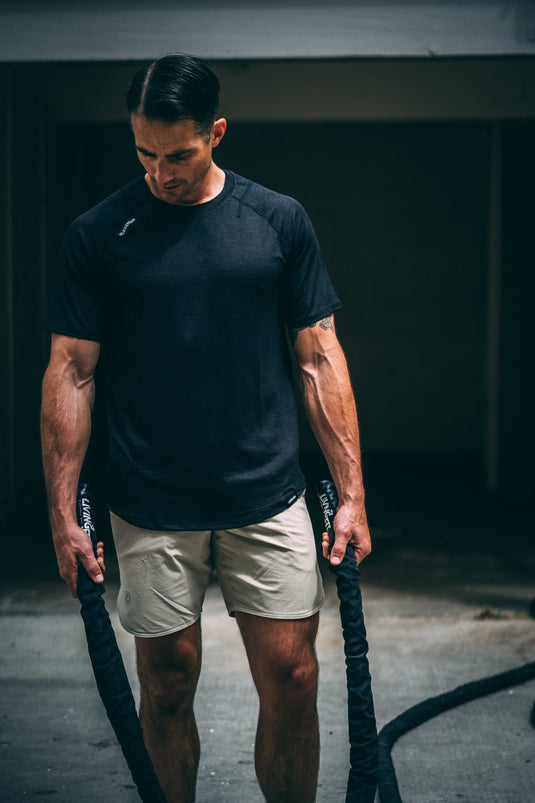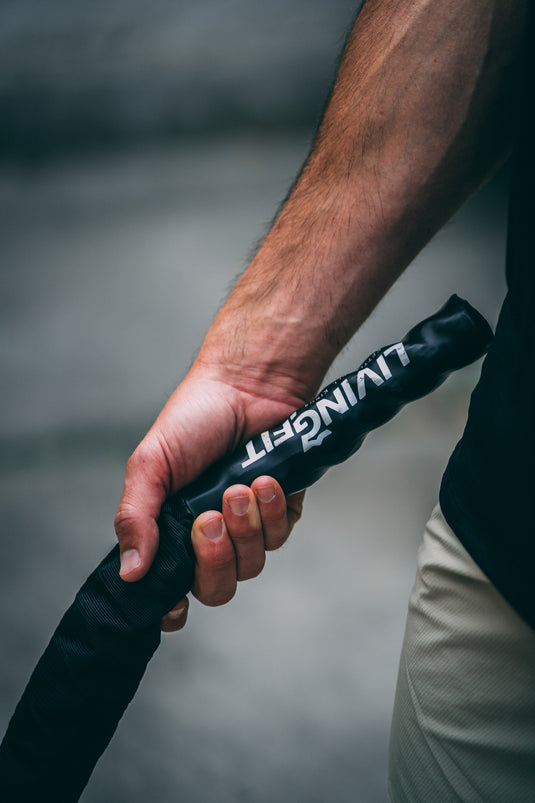Battle Rope Workout Programs
Battle Rope Workout Programs for Full Body Training
What are Battle Rope Workouts?
Battle rope workouts are dynamic and versatile exercise routines that utilize heavy, thick ropes to engage various muscle groups simultaneously. The ropes, often ranging from 30 to 50 feet in length, are anchored at one end, and you hold the other end while performing a variety of movements. But what makes battle rope workouts stand out? These workouts are not just about brute strength; they provide a holistic approach to fitness.
Benefits of Battle Rope Training
Battle rope training offers a wide range of benefits for fitness enthusiasts of all levels. First and foremost, it's an excellent cardiovascular exercise, elevating your heart rate and torching calories while improving your endurance. Additionally, battle ropes are an exceptional tool for building muscular strength and endurance. The constant resistance of the moving rope forces your muscles to work hard, leading to improved overall strength.

Top Battle Rope Exercises for Full Body Workout
A full-body workout with battle ropes involves various exercises targeting different muscle groups. Two foundational exercises are the Alternating Wave and the Power Slam.
- The Alternating Wave requires you to create a wave-like motion by moving each arm alternately, engaging your core, shoulders, and arms.
- Power Slams on the other hand, involve lifting the ropes overhead and forcefully slamming them down, incorporating your entire body for maximum power and calorie burn.
Beginner-Friendly Battle Rope Moves
If you're new to battle ropes, start with simple exercises like the Single Wave or the Rope Chop. The Single Wave involves moving both ropes together in a simultaneous up-and-down motion, focusing on coordination and stamina. Rope Chops, on the other hand, entail a chopping motion from one side to another, engaging your core and oblique muscles.
Understanding the Importance of Rope Slack in Workouts
Mastering rope slack is essential for effective battle rope workouts. Rope slack refers to the portion of the rope that hangs down between waves or movements. Proper utilization of rope slack can increase the intensity of your workout by engaging your muscles more effectively and adding an element of instability to your exercises.
Battle Rope Workout Plans for Full Body Training
Our battle rope workout plans are designed to cater to different fitness goals. The "Six Pack and Muscle Pump Program" focuses on core strength and muscle definition, while the "Lose Weight, Stimulate and Feel Great Program" combines cardio and strength training for weight loss. We also offer specialized plans like "Kettlebells + Battle Ropes Gains" and the "12 Week Military Program" for those seeking a challenge.
How to Incorporate Battle Rope Training into Your Routine
Incorporating battle rope training into your fitness routine is easy. Start by choosing a program that aligns with your goals and fitness level. We recommend at least 2-3 sessions per week. Remember to warm up before each session and maintain proper form to prevent injuries. Gradually increase the intensity as you progress, and don't forget to stay hydrated throughout your workouts.
Utilizing Battle Rope Alternating Wave for Muscular Endurance
The Battle Rope Alternating Wave is a versatile exercise that can enhance muscular endurance. It involves creating a continuous wave pattern with the ropes by moving each arm independently. This exercise engages your shoulders, arms, and core muscles, while the constant motion challenges your endurance and coordination.
Using Power Slams as a Battle Rope Finisher
Power Slams are an explosive battle rope exercise that can serve as an excellent finisher to your workout. To perform Power Slams, lift the ropes overhead and slam them down with force. This movement engages your entire body, from your legs and core to your shoulders and arms. Incorporating Power Slams at the end of your routine adds intensity and helps you burn additional calories.
Implementing Tabata Protocol for High-Intensity Battle Rope Training
Tabata Protocol is an effective high-intensity interval training (HIIT) technique that can be applied to battle rope workouts. It involves short bursts of maximum effort, followed by brief rest intervals. For example, you can perform Alternating Waves as intensely as possible for 20 seconds, followed by a 10-second rest, and repeat for several rounds. Tabata training with battle ropes boosts cardiovascular fitness and burns fat efficiently.

What are the Best Practices for Battle Rope Training?
To get the most out of your battle rope training, follow these best practices:
- Maintain proper form to prevent injuries.
- Start with a warm-up and end with a cool-down.
- Use a variety of exercises to keep your workouts engaging.
- Gradually increase intensity and duration.
- Stay hydrated throughout your sessions.
- Optimizing Battle Rope Moves for Upper Body Strength
To optimize battle rope moves for upper body strength, focus on exercises like the Alternating Wave and Power Slams. These exercises engage your shoulders, arms, and upper back muscles. Start with lighter ropes and gradually progress to heavier ones to challenge your upper body strength.
Mastering Battle Rope Alternating Waves for Lower Body Engagement
Mastering the Battle Rope Alternating Waves requires coordination and engages your lower body as well. The movement from the hips and legs contributes to the wave, making it an effective exercise for lower body engagement and overall cardiovascular fitness.
Utilizing Battle Rope Training as a HIIT Workout
High-Intensity Interval Training (HIIT) with battle ropes involves short bursts of intense exercise followed by brief rest periods. HIIT with battle ropes elevates your heart rate, burns calories, and builds both strength and endurance effectively.
Exploring Different Battle Rope Variations for Full Body Challenge
Explore different battle rope variations like Sidewinders, Snake Slams, and Crossovers to challenge your full body. These variations engage various muscle groups and add diversity to your workouts.
Using Anchor Points for Effective Battle Rope Workouts
Anchoring your battle ropes securely is essential for safe and effective workouts. Ensure your anchor point can withstand the force generated during exercises. Use sturdy equipment or anchor hooks designed for battle rope training.
How to Perform Specific Battle Rope Exercises?
Executing battle rope exercises correctly is crucial for safety and effectiveness. Follow these guidelines for specific exercises:
Executing Proper Form for Power Slams
Stand with feet shoulder-width apart, knees slightly bent, and engage your core. Lift the ropes overhead, then forcefully slam them down while maintaining a slight bend in your elbows.
Perfecting the Technique for Alternating Wave Patterns
Stand with a slight bend in your knees and a neutral spine. Hold the ropes with an overhand grip, and move each arm up and down alternately to create a continuous wave.
Ensuring Neutral Grip and Position for Battle Rope Training
Maintain a neutral wrist position to prevent strain. Keep your shoulders relaxed and engage your core throughout the exercises.
Understanding the Importance of Half Kneeling Position in Battle Rope Workouts
Half kneeling can be used to stabilize your lower body during certain battle rope exercises. Place one knee on the ground while keeping the other foot flat on the floor, engaging your core for balance.
Benefits of Battle Rope Training
Enhancing Cardiovascular Fitness through Battle Rope Workouts
Battle rope workouts are excellent for cardiovascular fitness. The dynamic and high-intensity nature of these exercises elevates your heart rate, improving cardiovascular health and endurance. Consistent battle rope training can lead to increased stamina and better overall cardiovascular fitness.
Building Muscular Endurance and Strength with Battle Rope Exercises
Muscular endurance and strength are core benefits of battle rope exercises. The constant resistance offered by the moving ropes challenges your muscles, leading to improved endurance and strength over time. This makes battle ropes an effective tool for both muscle toning and overall functional strength.
Improving Overall Functional Fitness with Battle Rope Training
Battle rope training enhances overall functional fitness by engaging multiple muscle groups simultaneously. This type of training mimics real-life movements and helps improve everyday activities, such as lifting and carrying objects. The increased coordination and balance developed through battle rope exercises also contribute to better functional fitness.
Incorporating Battle Rope Workouts for Full Body Toning
If you're looking for a workout that tones your entire body, battle ropes are an excellent choice. These workouts engage both upper and lower body muscles, making them ideal for achieving full-body toning and muscle definition.
Developing Core Stability and Upper Back Strength with Battle Rope Exercises
Core stability and upper back strength are essential components of battle rope training. Many battle rope exercises require a stable core and engage the muscles of the upper back. Consistent training with battle ropes can lead to improved core stability and upper body strength.
This detailed content provides a comprehensive overview of battle rope workouts, covering the basics, techniques, workout plans, advanced methods, and benefits. It also includes practical tips for optimizing your training and detailed exercise instructions. This comprehensive information will help visitors understand the value of battle rope workouts and inspire them to explore your collection of programs and plans.

